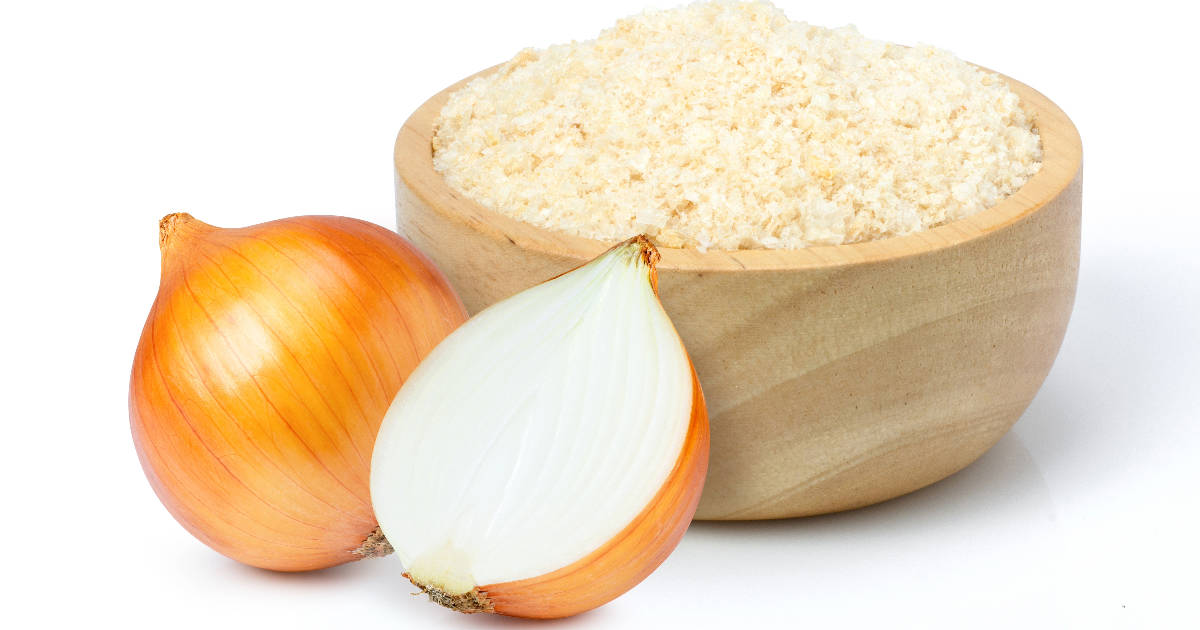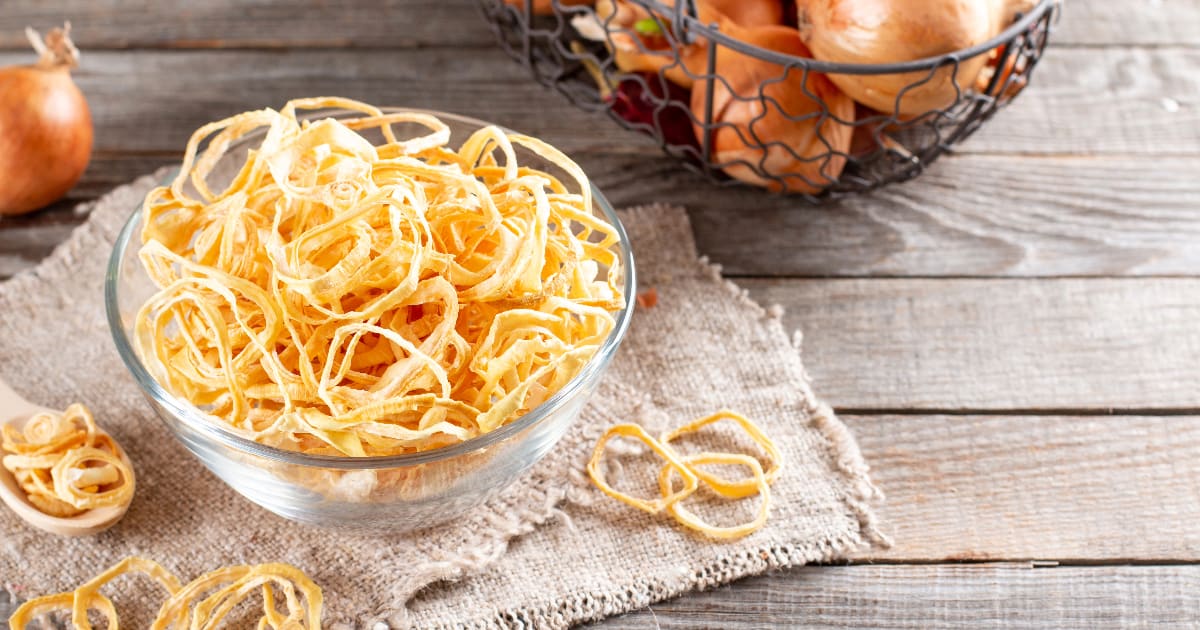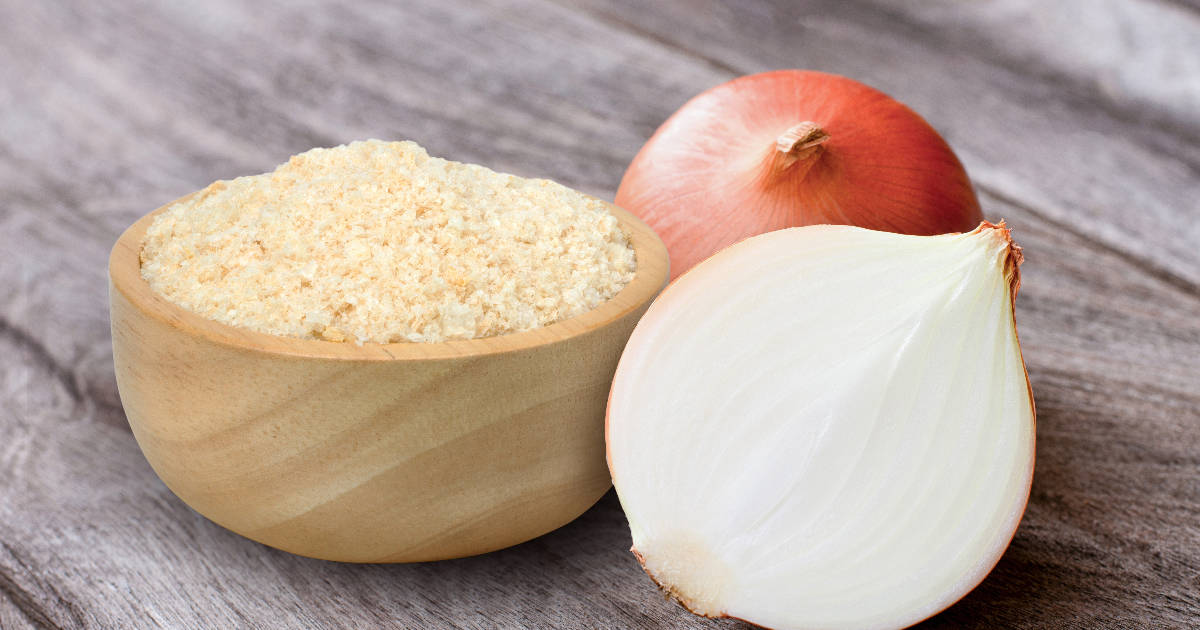Onion powder is a versatile ingredient that can enhance the flavor of many savory dishes.

While you can easily buy it at the grocery store, making your own homemade onion powder allows you to control the quality and flavor.
It's surprisingly easy to make with just a few simple ingredients and steps.
Select and Prepare the Onions
The first step is to choose what type of onions you want to use. Yellow, white, or red onions all work well, with red onions providing the strongest flavor. Avoid sweet onions, which have too high moisture content.
Once you've chosen your onions, peel off the papery outer skins. You can save these onion skins to make homemade broth later. Then, slice the onions as thinly as possible, ideally around 1/8 inch thick. Thinner slices will dry out faster. Some people use a mandoline for perfectly even slices.
As you slice, spread the onions across your drying trays in a single layer. Make sure the slices aren't overlapping or stacked, so air can circulate evenly.
Dehydrate the Onion Slices

Next, you'll need to dehydrate the onions until they are completely dry and brittle. This removes all moisture and prevents spoilage.
If using a food dehydrator:
- Set the temperature to 110-135°F. Lower temperatures preserve more nutrients.
- Dry onions for 6-12 hours. Time varies based on temperature and humidity.
- Check doneness by snapping a slice in half. It should crack apart easily.
If using the oven:
- Spread onions on a parchment-lined baking sheet.
- Bake at 140°F, stirring every 30 minutes until dry and brittle, about 2-4 hours.
- Prop the oven door open slightly to allow moisture to escape.
Grind the Dehydrated Onion into Powder
Once the onion slices are fully dried, they are ready to be ground into a fine powder. Use a spice grinder, food processor, blender, or coffee grinder to pulverize the onions into a powder texture. You may need to grind in batches depending on the blender size.
Grind until a fine, flour-like powder is achieved. Sift to remove any larger pieces, then grind again if needed.
Store in an Airtight Container
Transfer the finished onion powder into an airtight glass jar or container. Mason jars work perfectly. Make sure to label the jar "onion powder" to avoid mix-ups!
The key is keeping moisture out, as any moisture will cause clumping. You can add a few grains of dry rice to absorb moisture.
Stored properly in a cool, dark place, homemade onion powder will stay fresh for up to 1 year. Always give jars a shake periodically during the first week to prevent clumping.
Onion Powder Recipe

Ingredients:
- Onions (yellow, white, or red)
- Food dehydrator or oven
- Blender, food processor, coffee grinder, or mortar and pestle
- Airtight jars or containers for storage
Directions:
- Select onions and peel off the outer skin. Slice very thinly, about 1/8 inch thick.
- Spread onion slices in a single layer onto dehydrator trays. Make sure slices aren't overlapping.
- Dehydrate onions at 110-135°F until completely dry and brittle, 6-12 hours. If using the oven, bake at 140°F for 2-4 hours.
- Transfer dried onions to a blender or food processor. Grind into a fine powder.
- Sift powder through a mesh strainer to remove any remaining chunks. Grind again if needed.
- Transfer onion powder to an airtight container for storage. Add a few grains of uncooked rice to absorb moisture.
- Store the container in a cool, dark place. Onion powder will stay fresh for up to 1 year.
- Use onion powder to add flavor to meats, vegetables, soups, sauces, dressings, and more! Get creative with this versatile homemade seasoning.
Get Creative with Onion Powder Uses
Now that you have a batch of homemade onion powder, get creative with ways to use it! Onion powder is more versatile than fresh onions. Here are some ideas:
- Add to dressings, dips, and sauces for extra flavor.
- Sprinkle on meats before grilling or roasting. Also great on veggies.
- Mix into burger patties, meatloaf, meatballs, etc.
- Stir into soups, stews, and chilis during cooking.
- Add to dry rubs and marinades.
- Mix into bread, pizza dough, etc. before baking.
- Use when making seasoned salts like garlic salt or onion salt.
Any savory recipe can benefit from the addition of onion powder. Because of its concentrated flavor, start with small amounts and adjust to taste.
Make Onion Salt for More Versatility
If you want to expand the uses of your homemade onion powder even further, consider turning it into onion salt. Simply mix 3 parts salt with 1 part onion powder.
Onion salt contains salt for seasoning, allowing the onion flavor to shine. Use it as you would regular salt to give meals a flavor boost.
Dehydrating More than Just Onions
The process of making onion powder can be used for dehydrating and powdering many other foods as well. Garlic, ginger, tomatoes, carrots, and herbs like parsley work beautifully.
Get creative with the bounty from your garden by turning produce into shelf-stable powders. They make great gifts too! Herb powders also let you enjoy flavors year-round.
Dehydrating is one of the oldest food preservation methods, bringing new life to harvests. Making your own powders and spices allows you to customize flavors and save money. It's a handy skill for any home cook.
FAQ
What are the benefits of making homemade onion powder?
Making your own onion powder allows you to control the freshness and flavor. It contains no preservatives or additives like some store-bought powders. You can customize the type of onion used and grind size to suit your tastes. It's also significantly cheaper to make at home. Finally, you can feel good knowing exactly what's going on in your food.
Does homemade onion powder go bad?
Properly stored in an airtight container, homemade onion powder lasts up to 1 year. Always store it in a cool, dry place and avoid humidity. Over time, it will slowly lose potency as the flavors degrade. If you notice changes in aroma, taste, or texture, it's time to refresh your batch.
Can you use a coffee grinder to make onion powder?
Yes, a coffee grinder works well for grinding dried onions into a fine powder. However, the strong onion aroma and oils will likely linger in the machine even after cleaning. It's best to dedicate a specific grinder just for onions and other savory spices. Avoid cross-contaminating your morning coffee!
What's the difference between onion powder and onion salt?
Onion powder contains dehydrated, ground onion only. Onion salt is a seasoned blend of onion powder and salt, typically using a 3:1 ratio. The salt amplifies the onion flavor. Onion salt provides seasoning, while onion powder mainly provides flavor.
Conclusion
Whipping up homemade onion powder truly couldn't be easier. With just onions, a dehydrator or oven, and a way to grind them down, you can create a flavor-packed seasoning to use in all sorts of dishes.
Not only does homemade taste better than store-bought, but you can customize flavors exactly how you want. Making your own also saves money and reduces waste.
Use this simple DIY onion powder on meats, vegetables, in sauces, and anywhere else you want an onion flavor boost.

